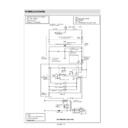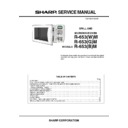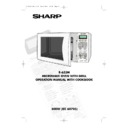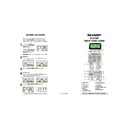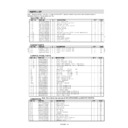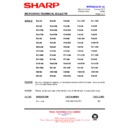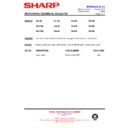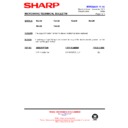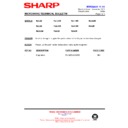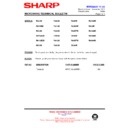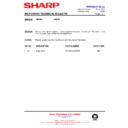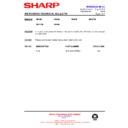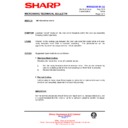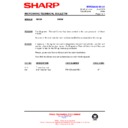Read Sharp R-653 Service Manual online
13
R-653M -
RE-WIRING
Ensure the following:
1.
Wires must not touch:
a)
High voltage parts.
(Magnetron, high voltage transformer, high voltage capacitor and high voltage rectifier assembly)
(Magnetron, high voltage transformer, high voltage capacitor and high voltage rectifier assembly)
b)
Parts that become hot.
(Heating elements, oven lamp, oven cavity magnetron and high voltage transformer)
(Heating elements, oven lamp, oven cavity magnetron and high voltage transformer)
c)
Sharp edges.
(Bottom plates, oven cavity, waveguide flange, chassis support and other metallic parts)
(Bottom plates, oven cavity, waveguide flange, chassis support and other metallic parts)
d)
Movable parts.
(Fan blade, any motor, switch, switch lever and open button)
(Fan blade, any motor, switch, switch lever and open button)
2.
Positive lock connectors are fitted correctly. Ensure the locking pin is located correctly.
3.
Wires are connected correctly as per pictorial diagram.
4.
No wire leads are trapped by the outer wrap.
WARNING:
Before carrying out any work carry out 3D checks
1)
D
isconnect the supply.
2)
D
oor opened, and wedged open.
3)
D
ischarge high voltage capacitor.
WIRING / RE-WIRING
MICROWAVE MEASUREMENT
After any repair, the microwave oven must be checked for
microwave leakage to ensure continued safe operation
BS EN 60335-2-25 specifies that the maximum permitted
leakage with a load of 275ml is 50 W/m
microwave leakage to ensure continued safe operation
BS EN 60335-2-25 specifies that the maximum permitted
leakage with a load of 275ml is 50 W/m
2
(equivalent to
5mW/cm
2
) at a distance of 5cm from the oven.
PREPARATION
The following items are required to carry out this test:-
1.
1.
A low form of 600ml beaker made from
electrically non-conductive material, such as
glass or plastic, with an inside diameter of
approximately 8.5cm. This must contain 275
glass or plastic, with an inside diameter of
approximately 8.5cm. This must contain 275
±
15ml of water, at an initial temperature of 20
±
2
°
C.
2.
A leakage detector which has been calibrated
within the preceding 12 months to a stand
whose accuracy can be traced to National
Physical Laboratory Standards.
whose accuracy can be traced to National
Physical Laboratory Standards.
Recommended instruments are:
Apollo "XI"
Celtec "A1000"
Celtec "A1000"
Before commencing the test, check the leakage detector is
functioning and adjusted according to the manufacturer's
instructions, and any spacers are fitted to ensure that
measurement is taken 5cm from the surface of the oven.
functioning and adjusted according to the manufacturer's
instructions, and any spacers are fitted to ensure that
measurement is taken 5cm from the surface of the oven.
Dotted line indicates the path taken by the leakage detector.
Whilst the maximum leakage permitted in BS EN 60335-2-25 is 50 W/m
2
(equivalent to 5mW/cm
2
), it is not
normal to detect anything significant, and therefore any detected leakage should be investigated.
PROCEDURE
1.
Place the beaker containing the water load
in the oven cavity at the centre of the
turntable. The placing of this standard load in
the oven is important, not only to protect the
oven, but also to ensure that any leakage it is
not disguised by too large a load absorbing
the energy.
in the oven cavity at the centre of the
turntable. The placing of this standard load in
the oven is important, not only to protect the
oven, but also to ensure that any leakage it is
not disguised by too large a load absorbing
the energy.
2.
Close the oven door, and with the power level
set to FULL, turn the oven ON with the timer
set for a few minutes operation. Should the
water begin to boil before the test has been
completed, it should be replaced.
set to FULL, turn the oven ON with the timer
set for a few minutes operation. Should the
water begin to boil before the test has been
completed, it should be replaced.
3.
As shown in the diagram below, move the
probe slowly (not faster than 2.5cm/sec);-
probe slowly (not faster than 2.5cm/sec);-
a)
around the edge of the door following the gap
b)
across the face of the door
c)
across any vents in the oven's sides, rear or
top
top

